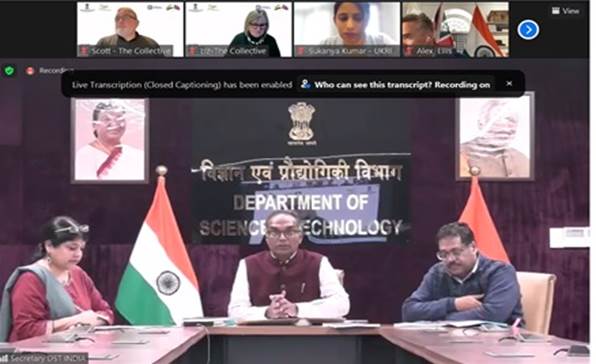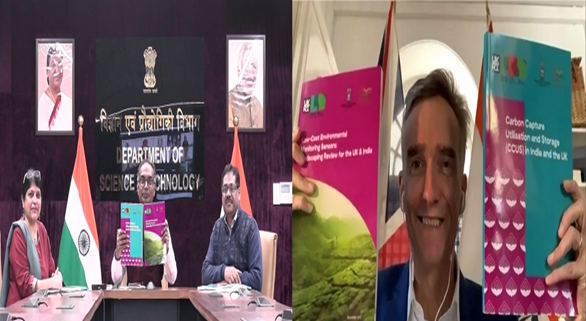Ministry of Science & Technology
Indo-UK workshop highlights commitment towards environmental goals of both countries
Posted On:
16 DEC 2022 11:23AM by PIB Delhi
Dr. Srivari Chandrasekhar, Secretary, Department of Science and Technology (DST), highlighted India’s commitment towards environmental goals, which includes consistent efforts towards the development of mitigation & monitoring solutions for environmental pollution and techno-based pathways for reducing carbon emissions to achieve net zero targets, at the Indo-UK Scoping Workshop on Low-Cost Environmental Sensors held yesterday.
Highlighting DST’s contribution towards carbon capture utilization and storage (CCUS) at the inauguration of the workshop, he said that DST has actively engaged in advancing R&D and capacity building in CCUS and has established Indian CO2 Sequestrian Applied Research (ICOSAR) Network.
The two-day workshop has been jointly organised by DST and UKRI/NERC from 14th -15th December 2022 to identify gaps and opportunities for research and start-ups to build collaborations between the academic communities in India and UK in the area of Environmental sensors.

Talking about the joint India UK programme on clean water under which the workshop on sensors was organised, Dr. Chandrasekhar pointed out, “The joint programme of DST, Natural Environment Research Council (NERC) UK, and Engineering and Physical Sciences Research Council (EPSRC) of UKRI, aimed to improve water quality by providing a better understanding of the sources and fate of emerging pollutants in both the countries and support management strategies through the development of low-cost environmental monitoring sensors (LEMS).”
During the event, Dr. Chandrasekhar and British High Commissioner to India Alexander Ellis released the two Indo- UK Scoping reports on the Low-Cost Environmental Sensors and Carbon capture Utilisation and storage (CCUS).
“DST and UKRI has jointly worked on mapping the existing research landscape, and this Indo-UK report on environmental sensors is an outcome of the mapping activity that India and the UK jointly commissioned. It plots the existing and ongoing research landscape in environmental sensors in India and the UK and attempts to identify the opportunities for bilateral collaboration,” Dr. Chandrasekhar pointed out.
“This Indo-UK Scoping report on CCUS is a result of collaboration between India and the UK to understand the research and development in this domain and identify the complementary strengths and gaps in the two countries,” he added.
He also underlined that India became a part of the international MI platform, along with other 21 member countries, including the UK, for collaborative research, development, and demonstration (RD&D) on Innovation Challenge IC#3 focusing on CCUS. DST India, the UK, and other ACT member countries are also participating in the multilateral Accelerating CCUS Technologies (ACT) platform for adopting best global practices” Dr S Chandrashekhar further outlined.

British High Commissioner to India Alexender Ellis said that India and UK both agreed last year that sustainable development goals and climate change are the basic pillars of their collaborations. “To combat climate change, we need adequate data for policy and actions as well as adopt suitable management approaches. So, the need of the hour is low-cost environmental monitoring sensors,” he added.
Officials from DST and UKRI / NERC/ EPSRC along with domain experts from both sides participated in the Scoping workshop on Environmental Sensors.
<><><><><>
SNC/RR
(Release ID: 1884015)
Visitor Counter : 1123